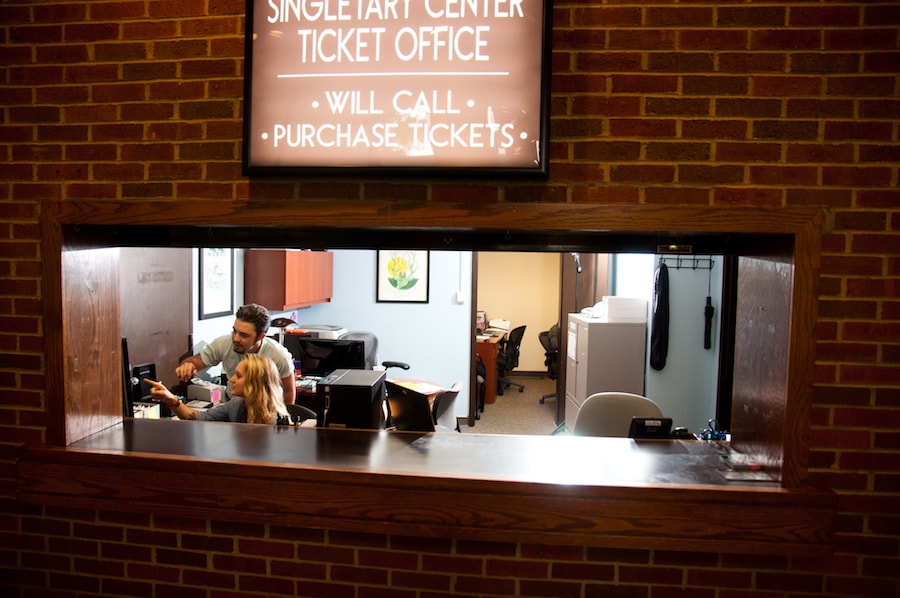I graduated with a B.A. in Theatre Arts and English. Now, four years out of undergraduate school, my Facebook feed fills with proclamations that my fellow performance peers have seen the light: They’re going to graduate school for arts administration. They’re drawn to producing and marketing and development, to making the magic happen behind the scenes. (And let’s be real, they’re also drawn to competitive salaries and benefits.) But what if this career pathway could be achieved without venturing further into debt?
A 2017 study conducted by the Strategic National Arts Alumni Project (SNAAP) shows that folks who study the arts, both fine arts or performance, ultimately end up in administration or management roles. Now a few dozen universities across the U.S. are hoping to help students to see the light sooner by offering degrees in arts administration at the undergraduate level.
“There’s a moral obligation to provide access to those skills as part of arts education,” says Diane Scott, associate professor in arts management and chair of the fine and performing arts department at the Massachusetts College of Liberal Arts. The program, much like other arts admin undergraduate programs, is fairly young—it was established 11 years ago.
“Arts management is bringing an idea into action,” explains Lisa Donovan, another professor of arts management at Massachusetts College. The school requires students in any of its conservatory programs to take an arts administration course freshman year, in which the students learn how to write grants, apply for funding, and self-produce work.
Over the past few years, Donovan has noticed a “paradigm shift” among students. “It’s about realizing how these skills dovetail,” she says. “You’re not selling out, you’re actually making your work deeper and stronger.”
Conservatory students at Pittsburgh’s Point Park University, mainly in the dance program, are also hopping on the arts administration train. Many realize that the career of a dancer is inevitably short, so they’re capping their long days at the studio in the classroom, working toward a business degree in the school’s Sports, Arts, and Entertainment Management (SAEM) program with hopes to one day open their own dance studios. At Purchase College in Harrison, N.Y., arts administration classes are offered at night, and a minor has been created to cater to dancers looking to supplement their training with transferable admin skills.
“We love when we have conservatory students in our classroom, because they are so disciplined,” says Steve Tanzilli, co-founder and chair of the SAEM program. “They work so hard because of their schedule and I think the quality of the classroom is risen because of their capabilities and work ethic.”
And that’s just it: Who better to steer the marketing campaigns, win over the hearts of donors, or run a studio than those who truly understand the arts?
“Theatre folks make really great arts managers,” says Massachusetts College’s Scott. “They don’t realize the level of organizational training they’re getting by working in theatre. You have to be able to work with lots of different people, it’s time-bound, there are money issues, there are a sorts of coordination issues. They have a ton of the skills they need, they just need to learn how to apply them.”
Even the students set on pursuing a performing arts career for the long haul benefit from learning how to apply admin skills. The SAEM program at Point Park University offers required courses for the theatre conservatory students. They learn about personal finance, intellectual property, disability insurance, and a whole host of other useful skills to prepare them for post-graduate life in expensive cities. Purchase offers a course in independent producing, and even how to craft press releases.

Not all arts administrators are reformed artists, of course. Many in these undergrad admin programs come with high school theatre backgrounds; others didn’t make the cut for the conservatory. At the University of Kentucky, home of the oldest arts administration program in the country, many students are entering the school with declared arts administration majors. The number of required credits for theatre majors is now dropped so that students can double major in arts administration—which they all do—bringing the total number of majors into the 200s.
“We had our largest incoming freshman class this year, with 34 declared arts administration students,” says Rachel Shane, the department chair and associate professor of arts administration. “Which sounds small, but what high school student knows about arts administration?”
Clearly high school counselors, drama teachers, and art teachers are onto something.
At Point Park University, some students come with dreams of managing of a major sports team. The SAEM program offers a taste of both sports and media, with classes like collective bargaining in sports and courses on the Screen Actors Guild. Tanzilli notes that some of the students with football aspirations are now company managers for Broadway shows, while other theatre-focused incomers are now working as stage managers for ice hockey teams.
“We’ve always believed that how you sell a ticket to Hamilton is very similar in how you sell a ticket to a baseball game or a rock concert,” says Tanzilli. “It’s about understanding your target market and what is the most efficient way to reach them.”
It’s about having the freedom to explore all the different avenues, between both the commercial and nonprofit sectors, across all different arts (or sports) disciplines. Internships, work hours, and co-op programs help students get the necessary hands-on experience.
At Massachusetts College, a group of theatre majors paired with arts administration students last year to produce and market a student-penned play about gun violence. The show went up at the prestigious Mass MOCA.
Point Park’s new $62-million building includes a “learning laboratory” for the students. The SAEM students will learn about facility management and work to market and promote the building’s programming, and IT students will build apps and online ticketing platforms. Experiences like this will help more students follow in the footsteps of one alumni who now manages New York City’s Madison Square Garden.
Dawn Gibson-Brehon, arts management professor at Purchase, points to the students’ culminating research paper that serves as a jumping off point into the industry. “How can this research assignment help you segue from a student to the real world?” she asks. One student’s paper turned into a fully prepped business plan for opening a studio.

So what’s the verdict on going onto a graduate degree? “Hardly any of our students do,” says University of Kentucky’s Shane. “They’re so well prepared to have job placement.”
Among the cohort of U.K. graduates last year is a national tour producer and a company management apprentice at the Actors Theatre of Louisville.
“There is some disagreement about what is the terminal graduate degree in the field,” says Jerome Socolof, assistant professor in arts management at Massachusetts College. “You could go and earn an M.A., MFA, or, at a handful of schools, a Ph.D.—all of them cover a fair amount of ground and all have reasonable to claim to be a terminal graduate degree. But we are focused on making sure that we give our students a functional skill set so that they can have a great career just based off their undergraduate education.”
The college, nestled in the Berkshires, can lead to jobs at nearby Barrington Stage Company, Berkshire Theatre Group, and the Williamstown Theatre Festival, among other institutions.
Point Park’s Tanzilli says, “If you’re going to teach at a business school, an MFA is good but a MBA provides a little more insulation.”
But an elephant in the room remains.
“I’m very concerned with the cost of education these days, and I have children,” says Purchase’s Gibson-Brehon. She holds an M.A. from Bolz Center for Arts Administration at the University of Wisconsin–Madison, but doesn’t think a master’s degree is the right path for everyone. “I want students to be able to leave school and be able to sustain themselves, and I don’t know how they can do that when they’re saddled with so much debt.”
The 2017 SNAAP study shows that students who graduated in the last five years reported twice the rate of major impact from student debt on both their career and educational decisions than students in the past. Moreover, these same alumni also reported lower satisfaction with their experience in school and less connection with the institution post graduation. Undergrad degrees aren’t low-cost options either, but by mitigating the need for an additional higher degree they may reduce graduates’ overall debt levels.
Just as the undergraduate programs are growing in interest, curriculums are morphing to serve a changing field. Each of the schools I spoke to noted the Association for Arts Administration for Educators, a service organization that provides curricular standards and hosts conferences for sharing best practices for arts admin training. There are classes on crowdfunding, electronic-communications, mobile-optimized tools for gathering data, creating digital press kits, and more to teach tech skills. Massachusetts College now offers an arts administration focus in arts education and community engagement, and an advanced applied theatrical marketing class, per the students’ request.
“With this whole new crop of people coming to our institution, and other institutions, we are really framing the field and having a significant impact on how these organizations operate,” says Scott of Massachusetts College. “It’s important for the future for there to be a solid base of people going into the field that have this information and can professionalize it.”
After talking to the movers and shakers behind these programs, my spiel to college-bound students looking to pursue the arts will be different going forward. My crusade to inspire folks to get a B.A. will now be twofold: Use the opportunity to double major to get a degree in arts administration. You can now have your cake and eat it too.



